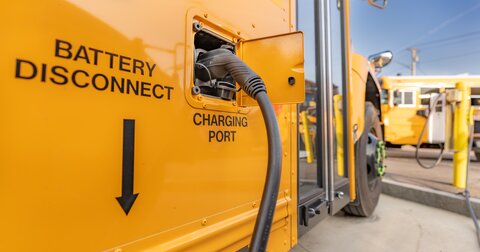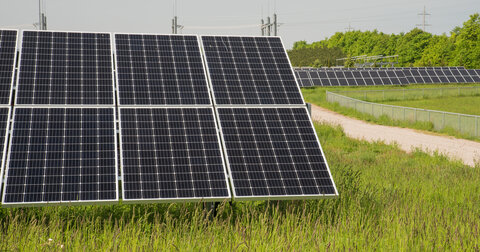27 Michigan school districts to get 97 electric school buses
EV school buses cost up to three times more than a diesel school bus
Twenty-seven Michigan school districts will receive 97 school buses powered by electricity and three fueled by propane. The cost, nearly $24 million, will come from the federal Clean School Bus Program.
Buses powered by electricity often cost three times more than diesel buses, but they emit fewer tailpipe emissions over the long run.
The transportation sector accounts for almost 28% of Michigan’s total greenhouse gas emissions. Michigan aims to be 100% carbon neutral by 2050.
The school system in Grand Rapids will receive $5.18 million for 15 buses. Trenton will receive $2 million for 10 buses, Allen Park will get $1.04 million for five buses and Comstock will get $1.04 million for three buses.
Propane buses are significantly cheaper than EV buses. The Dearborn Academy is spending $1.04 million for three EV buses, but Gwinn Area Community Schools will spend only $35,000 for a propane-fueled bus.
Electric and propane buses could carry fewer maintenance expenses, such as oil changes and transmission repairs.
But EV school buses lose about 33% of their range during severely cold weather.
Rep. Pat Outman, R-Six Lakes, told CapCon the Tri-County Area Schools in his district doesn’t want EV school buses, which wouldn’t have the range needed for the rural district that spans Montcalm, Kent and Ionia counties.
Gov. Gretchen Whitmer wants 2 million EVs on Michigan roads by 2030, but there are currently 46,792. The MI Healthy Climate plan says the state must build 100,000 EV chargers in 2030 but there are only 1,533 stations with 3,577 charging ports.
“I never think these electric vehicles will be what we want them to be,” Outman told CapCon in a phone interview. “From supply chain to just practicality, I don’t see them becoming as mainstream as they want them to be.”
Outman said Whitmer and the Biden administration are “trying to dictate the market through policy” but many consumers don’t want to drive EVs in his rural district.
Phil Roos, director of the Michigan Department for Environmental, Great Lakes, and Energy, said Michigan had 17 EV school buses before Congress passed the Bipartisan Infrastructure Law in 2021. It should have close to 200 buses once the 97 new vehicles are delivered.
“I applaud the Biden administration and our hardworking congressional delegation for investing in electric school buses, improving air quality, allowing schools to invest in the classroom, and helping us meet the goals of the MI Healthy Climate Plan,” Roos said in a statement.
The state is 1.9 million vehicles short of its 2030 EV goal.
“These Bipartisan Infrastructure Law dollars will help 27 school districts purchase new electric and clean school buses, providing a safer and cleaner ride to school for students while reducing costs for schools, allowing them to put dollars back into the classroom,” Michigan Chief Infrastructure Officer Zachary Kolodin said in a statement. “By investing in clean school buses, we’re not only upgrading our transportation systems; we’re improving air quality by reducing diesel fumes, safeguarding the health of students and communities across the state.”
Michigan has nearly 17,000 buses that transport more than 800,000 students each school year.
Michigan Capitol Confidential is the news source produced by the Mackinac Center for Public Policy. Michigan Capitol Confidential reports with a free-market news perspective.


 Electric school buses lose one-third of range in cold weather
Electric school buses lose one-third of range in cold weather
.jpg) Michigan schools seek $1.6 billion in new public debt May 6
Michigan schools seek $1.6 billion in new public debt May 6
 Why $125M won’t buy many electric school buses
Why $125M won’t buy many electric school buses

 37 states have cheaper electricity than Michigan does, report says
37 states have cheaper electricity than Michigan does, report says
 Nessel, 14 other attorneys general sue Trump administration over declared energy emergency
Nessel, 14 other attorneys general sue Trump administration over declared energy emergency
 Michigan’s renewable energy report card
Michigan’s renewable energy report card